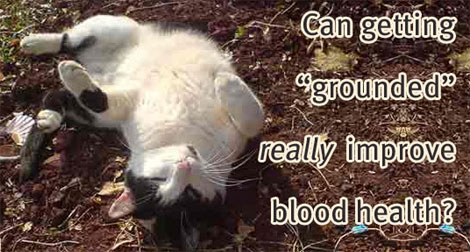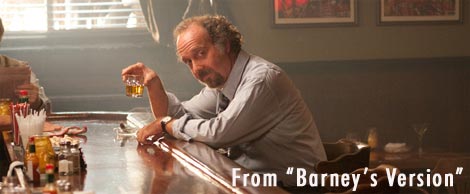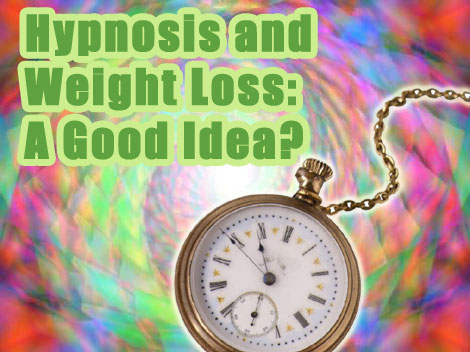
Jim here with another intriguing installment of Weird Wednesday.Look, I'm a hugefan of gigantic, mondo salads. If you (well, not raw foodists but most SAD-diet Americans) were to visit our house at lunch time, you'd likely think that the individual salads on our table are as big as the salads bowls put out for entire families (for those few families, relatively speaking, that serve any salad at all these days, that is).
Seriously, when I have enough prep time, I like to pile 'em high with organic green leaf (though I'll take red leaf or romaine frequently), tomatoes, carrots, onions, peppers, apple slices, pepitos, sunflower seeds, raisins -- basically everything but the kitchen sink.

Jim here... A week or two ago, there were some videos floating around in raw food circles that seemed to indicate that one's blood health (and, by extension, one's overall health) can be quickly and dramatically improved through a practice known as grounding. I realize that, metaphorically, people commonly use the term "grounded" to indicate a kind of level-headedness -- e.g., a "down to earth" attitude. But, in the literal sense, it's an electrical term used to describe a physical connection to the earth. I'm no engineer, but my understanding is that these connections basically discharge things or people from any static electricity build-up (as in those bracelets that computer repair techs wear), or serve as a conduit through which other electricity may pass (as in lightning rods).
 That the idea of "grounding oneself" should take root so strongly in natural health circles is unsurprising. In theory, it seems to make a lot of sense. I'm just as intrigued by it as the next person, I suppose. If we spend most of our lives wearing rubber-souled shoes, walking on shag-carpeting, sitting suspended off the ground on static-filled things like couches and office chairs, often running various electrical equipment, basking in EMFs from radio waves and Dish-network signals and cell phone radiation... sure, it makes sense that we're probably all experiencing some heretofore unprecedented (evolutionarily speaking) human body exposure to significant electrical phenomena. My car reminds me of this daily with a (friggin' annoying!) shock each time I get out and close the door. But, as the "double-rainbow guy" so succinctly put it: ?What does it mean
That the idea of "grounding oneself" should take root so strongly in natural health circles is unsurprising. In theory, it seems to make a lot of sense. I'm just as intrigued by it as the next person, I suppose. If we spend most of our lives wearing rubber-souled shoes, walking on shag-carpeting, sitting suspended off the ground on static-filled things like couches and office chairs, often running various electrical equipment, basking in EMFs from radio waves and Dish-network signals and cell phone radiation... sure, it makes sense that we're probably all experiencing some heretofore unprecedented (evolutionarily speaking) human body exposure to significant electrical phenomena. My car reminds me of this daily with a (friggin' annoying!) shock each time I get out and close the door. But, as the "double-rainbow guy" so succinctly put it: ?What does it mean

Last night, we watched a movie called Barney's Version which, among many other things, touched on the issue of Alzheimer's (or dementia). (It also touched on the issue of painfully awful movie titles, in my opinion.) But, I have to admit: Movies like that (or, even being around people affected by this) cause me to seriously look at my own life and reflect upon how I might be doing in terms of preventing not just Alzheimer's, but all major diseases.
My grandmother had severe dementia, and we witnessed the full progression of this awful condition for many years. I felt awful for her and readily admit that it scared the hell out of me to know that a formerly sharp, witty human being could end up this way. If you've never been around it, trust me: You do not want this for yourself or anyone.

I was reminded about a video I saw some time ago, after seeing a similar video on my dear friend Bunny's blog. What you are about to see is AMAZING!!
Take the time to meet...

Quick note: Jim here... So strikingly pervasive is the "winter blues of 2010" that I suspect many of my friends will think this is about them. But, it's just some thoughts, really -- not in response to anything or anyone in particular. (In fact, if anything, it's in response to something related to our dog, which we'll no doubt write about at some point.)
I sense that there is a useful blog post on the topic of "raw during tough times." However, after pondering the topic at length, I'm just not exactly sure what to say about it. I do know that quite a lot of people come to feel disappointed in themselves for straying from the healthiest path. It's a story I've read over and over on raw web sites and blogs, perhaps more frequently in the winter. It starts out the same: Someone goes raw, gets all fired up about it, and soon starts feeling youthful and vibrant again. The high lasts for a while, but then ... something happens. They slip back to cooked foods -- or worse, to junk foods. Sometimes the process repeats itself for years.
"Should you eat when you're not hungry "
That was a question I asked myself a lot when I was first transitioning to the raw food diet. Just about everything I ever read said that people shouldn't eat if they aren't hungry. We need to listen to what our bodies are telling us in order to be as healthy as possible.
What if your body is telling you it's not hungry, however, while your instinct is telling you that you still need to eat That's what was happening to me in the beginning of my raw journey. My digestion was very slow and food would sit in my stomach for most of the day, especially if the food I ate was processed or heavy. It didn't matter how much I ate, either. My portions were always very small compared to those that my fit-looking friends were eating. I always wondered how I was the obese one when my meals were so minimal in comparison.
Read more: Inner Guidance: Should You Eat When You're Not Hungry?

When you get into raw foods, one thing you're probably going to notice from time to time is that others are "concerned" about your health. This is hugely ironic -- not only because it's likely your own concern about your own health that brought you to raw in the first place, but because you most likely hold the conviction that the raw food diet (or some close variant of it) represents the most healthy dietary regimen available for humans.
Nevertheless, you'll receive a lot of concern. You'll receive it even when you have that "raw glow" and are looking and feeling better than you have in years! The main concerns:
After so looooong, the much-awaited Episode 6 is here of "Know Your Food"! Aren't you thrilled? Well, WE are. We're fantastically excited to announce that we have SIX thrilling new eipsodes "in the can" (as we film buffs like to say). So, here's the first of those six, in which your humble nutrition researchers reveal the hidden secrets of cacao, that delicious tropical ambrosia that opens your heart like nothing else. So, grab a raw chocolate snack of your choice and curl up in front of your favorite flat screen. Here's the vid:
Whoa, what'd you think of the "Monkey Brains" scene ! Have we finally used EVERY SINGLE hoaky feature of the Windows Movie Maker software? (Don't answer... Those were rhetorical questions.) In case you couldn't read some of the nutritional information, here's a summary of the key components of this delicious bounty from the Earth's equatorial regions. Raw chocolate contains:
I have a need for hot food in winter to feel warm.
We hear this comment a lot from those trying to lose weight. Some joke that they thought their excess body fat would be keeping them warm, but they're still feeling cold and needing hot food in the winter months.
In the past, we've talked about reasons what's going on in the body when hot foods are consumed. Understanding this will help you realize that hot foods are actually not very good for our bodies. When we consume very hot foods, that heat is then inside our bodies, next to vital organs, while the body needs to maintain a temperature around 98.6 degrees. When we have temperatures higher than that right next to our vital organs, it must quickly work to remove that excess heat. It's the removal of this excess heat that causes us to feel warm. It's our bodies trying to stay in a healthy state. We are actually putting our bodies under stress when we do this (the same holds true for eating overly cold foods, like frozen desserts and icy drinks).
Do you need to be 100% raw to release excess weight and regain your health There's no difinitive answer for that question because we are all unique. Sure, our bodies function pretty much the same way, but there are still enough differences that make it difficult to answer a question like that for it to be true for every single individual.
Most of us have heard of, or know, someone who doesn't eat a healthy diet, who smokes cigarettes and/or drinks alcohol, doesn't get enough rest, and also lives a stressful life---yet that person still has a healthy body and is over 80 years old. People like that seem to have resiliency built into their genes. Sure, who knows how long a person with such resilient genes could live or how vibrant a life that person could enjoy with a healtheir lifestyle. But, the fact remains that it seems no matter what a person's lifestyle is like, if you are born with resilient genes you are pretty much invincible to most illnesses.
A majority of the population isn't born with such impressively hardy genes, however. Most bodies can withstand the stresses of an unhealthy lifestyle until middle age. At that point, however, the body begins to show signs of ill health (excess weight gain, aches and pains, and the start of many diseases such as diabetes or high blood pressure). For a majority of those individuals, some healthy lifestyle changes can make a huge difference. Many individuals regain their health simply by changing their diets to include less fat and more vegetables, and by increasing their amount of exercise. Sure, it's a bit of work to make such changes, but if many people are committed to improving their health those simple changes can make a drastic difference in their lives.

Recently, the wife of a friend of ours decided that she wanted to lose 20-25 pounds. As far as we know, she follows pretty much a "Standard American Diet." We've heard that she doesn't care for red meat, but she does eat other meats, plus a good deal of dairy (which, we believe, she regards as a healthy food choice). She's apparently tried a number of exercise regimens, and a few fad diets, with no luck on losing these 20-25 pounds. (Frankly, we haven't seen her many times, but would not have guessed that she had 25 pounds to lose. But, we'll save "self image" as a topic for for further posts.) In any case... Frustrated, she decided to see a hypnotist!
Our friend accompanied his wife to the initial consultation. He said it was actually interesting. The hypnotist basically sits you down and walks you through some fundamental psychology, demonstrates a few of the primary principles of suggestion (e.g., showing you how easy it is to, say, imagine the sourness you would experience when biting into a slice of lemon), and then lays out how the program works.
